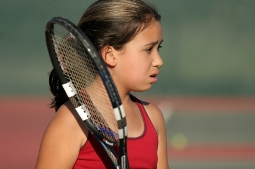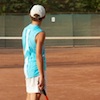Mental Toughness Of Junior Tennis Players And How Parents Can Help

|
Apply the exercises, and do them regularly. Do one exercise one week; then move to the next. When you finish them all, you can start again at the beginning.
The Mental Manual will help him with simple tips and ways of thinking to overcome the critical situations in a match.
There are, of course, other ways to improve the mental skills of young players.
Realize that children are incredibly naive and unrealistic. If they miss ONE easy ball in a match, they will tell you later that they ALWAYS miss easy balls.
I remember watching the match of a 12-year-old girl who afterwards said she was very disappointed in her serving. I didn't think it was so bad, but she tried to convince me that she made 8 or 9 double faults.
Her father had taped the match, and after we watched it, she saw that she made only 2 double faults.
Things like this happen because powerful emotions magnify the disappointment into something horrible.
Reality gets completely distorted, and a there is danger that the player starts believing their own distorted perceptions, thus creating limiting beliefs.
So the key for parents and coaches is to play two games with kids: one is the unrealistic one, since this is the way kids understand the world.
Play The Unrealistic Game
Have him play with less skilled opponents so he wins many matches. See if you can enter a lower tiered tournament.Andre Agassi had to play Challenger tournaments to regain his confidence. Nothing changed in his stroke technique or knowledge of tennis strategy, and he was fit enough to play 3-set matches, but he needed confirmation that he is a winner, WHATEVER winning it was.
The mind will eventually remember only the win and not the circumstances. Just as the unrealistic mind can destroy one's confidence, it can build confidence through unrealistic wins.
Encourage your son, and become master of NOTICING WHEN HE IS SUCCESSFUL instead of noticing when he makes a mistake. It takes good awareness and practicing for a while to change this automatic pattern we have in our minds.
If I sometimes see that my players (especially girls) are not in a good mood, I stop instructing them or (God forbid ;)) correcting them. Instead, I WAIT UNTIL they make a good shot, and then I comment on it.
That's how I shift their awareness from mistakes to good shots. Their mood and energy improves.
The other game that you need to play is the realistic game.
The Realistic Game
Young children (up to 14 or 16 years old) often don't get it. Their emotional mind tells them that they missed ALL the easy shots, and you are telling them that they missed 2 and hit 5 shots well.I've had good success by showing examples and statistics from top players.
I've shown how many matches these top players lose in a year and still finish in the top 20 worldwide, how many games they lose in a set and still win the set, how many easy balls they miss and still win the match ...
I've shown kids head-to-head stats proving that you cannot ALWAYS beat lower ranked players.
I've shown top players missing easy sitters to help kids realize that you cannot always hit in.
And so on. Showing them proof (through videos, statistics, and other documentation) is much better than trying to persuade them.
Because eventually you need to get kids aligned with reality, so they don't create limiting beliefs like He is a higher ranked player so I cannot beat him or I made a double fault so my second serve sucks.
This is what I call "acceptance." It means that you accept reality as it is and don't fight it.
It means accepting that your wants and wishes may not come true soon (not today, tomorrow, or whenever) but you keep trying.
Eventually you need to shut down your thinking and just play. A player needs to enter the zone for best performance, where there is no thinking and no mental skills. In the zone you don't control your arousal, you don't monitor your thoughts, you don't need to take time to breathe and let go of the tension, you just play.
So, eventually, a player must learn not to think but to play automatically, to just notice some tactical patterns and adjust accordingly.
It's quite a journey to this stage, but it happens now and then even when a player is young.
For the end, I would like to add some of my thoughts on this matter.
Since I've been working as mental coach for tennis players for some years now, I've often been approached by parents who said that their child needs help in the mental game.
And I agree, since the mental game is a challenging one, and children need guidance and support to master it.
But not many parents realize that it is THEIR behavior that is the cause of major mental weaknesses of their child.
It is the parents who need to work on their mental game in order to help their children.
They need to be confident, to trust in their child, to control their emotions, to think positively and to accept reality even when it's not to their liking.
Children are very strongly influenced by their parent's behavior and emotional responses, much more influenced than by their parent's talk, especially if they detect a difference (insincerity) between the parent's talk and real feelings.
It's a journey for both a tennis parent and a tennis junior player.
It's not about fixing your child's faults or weaknesses, it's about accepting and loving children as they are. They will improve by themselves.
All the best in your tennis journey,
Tomaz
Below is the reply of the tennis parent emailing me a couple of months later and we can all learn from it:
----------------------------------
Dear Tomaz,
I read your reply to my email back in June and I thought long and hard about it.
I must admit that you were right. I was my son's problem without realising it. I put a lot of pressure on him to perform well, and this pressure prevented him from enjoying his tennis. As a result he was underperforming.
Since your answer, I tried many different things, some of which worked out well and some which did not. But I feel that in my very short experience as a failed tennis parent, I am becoming very wise and can share with you some of this knowledge that I have acquired.
The things that have helped us both were:
1. Stop giving instructions all the time, especially in the car driving to a tournament.
2. Stop talking about tennis all the time. I constantly have to remind myself that he is only 9 and that he enjoys playing with his Playmobil just as much as his tennis.
3. During tournaments, I sit as far as away from the court as possible. Close enough for him to feel secure that I am around but far enough for him not to be in a position to see my emotions during his match. (I was and - though improving fast - still am bad at hiding my emotions.)
4. By talking to him, I discovered that he was not playing tennis for himself but to impress me, and when things started going wrong in a match, like you said, he convinced himself that he was not playing well and his game went to pieces. It took me months of talking about it with him to convince him that he had nothing to prove to me.
But what really did it was taking off some of the pressure I was putting him under.
As a result of all this, he loves his training again (12-15 hrs per week), he loves taking part in tournaments and in general enjoys his tennis. Needless to say, his results have improved dramatically, winning all the matches that he should win.
When he loses, he loses after a good fight and never gives up until it is over. Even then, he comes off the court with a smile and not crying as before.
During these couple of months I realised that this is a painful learning curve, that all tennis parents have to go through it, and that even at the age of 40 as I am now, you never stop learning how to handle different situations.
Anyway, I just want to thank you for your advice and let you know that it was very helpful. I will keep you posted and come back for more advice that I am sure I will need in the future.
You may also like -








